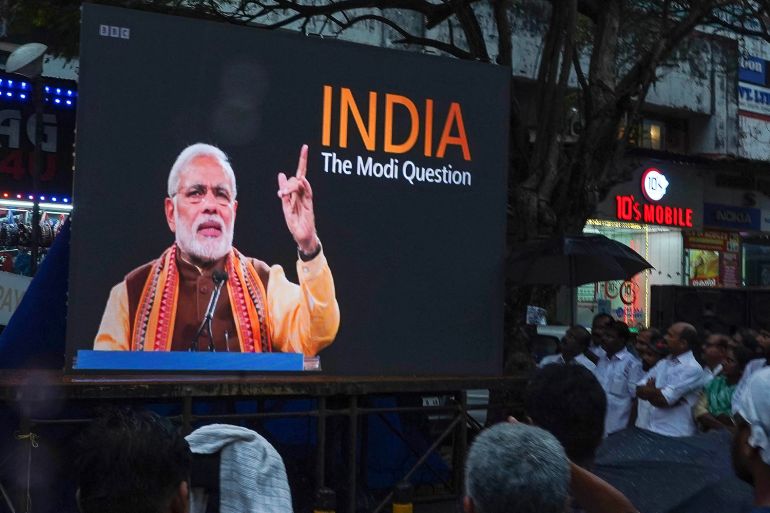Human Rights Watch and Amnesty International schedule a private screening in Washington, two days ahead of Indian PM’s state visit.

The two-part documentary, India: The Modi Question, focuses on Modi's leadership as chief minister of the western state of Gujarat during riots in 2002 [File: Arun Chandrabos/AFP]
Published On 13 Jun 2023
Two human rights groups have invited policymakers, journalists and analysts to a screening in Washington of a BBC documentary on Narendra Modi that questions the Indian prime minister’s leadership during the 2002 Gujarat riots, ahead of his state visit to the White House.
Human Rights Watch and Amnesty International have scheduled the private screening for June 20, two days ahead of Modi’s official state visit, hosted by United States President Joe Biden.
In announcing the screening on Monday, Human Rights Watch said it wanted it to serve as a reminder that the documentary had been banned in India.
The two-part documentary, India: The Modi Question, focused on Modi’s leadership as chief minister of the western state of Gujarat during riots in 2002 in which at least 1,000 people were killed, most of them Muslims. Activists put the toll at more than twice that.
Modi has denied accusations that he did not do enough to stop the riots, and a Supreme Court-ordered investigation found no evidence to prosecute him.
The Indian government had reacted angrily to the documentary, which was released in January, calling it a “propaganda piece” and blocked sharing of any clips from it on social media.
The White House last month defended Modi’s planned state visit when asked about human rights concerns in India. Press secretary Karine Jean-Pierre said Biden believes “this is an important relationship that we need to continue and build on as it relates to human rights”.
Advocacy groups have raised concerns over what they see as a deteriorating human rights situation in India in recent years under the Hindu nationalist Bharatiya Janata Party (BJP) of Modi, especially when it comes to its treatment of minorities, dissidents and journalists.
The government denies the allegations and says it works for the upliftment of all the groups.
Tax officials inspected offices of the BBC in New Delhi and Mumbai in February and the financial crime agency opened an investigation into the broadcaster in April over charges of violations of foreign exchange rules. A government adviser had said the inspection was not “vindictive”.
The BBC has previously said it stood by its reporting for the documentary, which was not aired in India, and that it “does not have an agenda”.
SOURCE: REUTERS
Two human rights groups have invited policymakers, journalists and analysts to a screening in Washington of a BBC documentary on Narendra Modi that questions the Indian prime minister’s leadership during the 2002 Gujarat riots, ahead of his state visit to the White House.
Human Rights Watch and Amnesty International have scheduled the private screening for June 20, two days ahead of Modi’s official state visit, hosted by United States President Joe Biden.
In announcing the screening on Monday, Human Rights Watch said it wanted it to serve as a reminder that the documentary had been banned in India.
The two-part documentary, India: The Modi Question, focused on Modi’s leadership as chief minister of the western state of Gujarat during riots in 2002 in which at least 1,000 people were killed, most of them Muslims. Activists put the toll at more than twice that.
Modi has denied accusations that he did not do enough to stop the riots, and a Supreme Court-ordered investigation found no evidence to prosecute him.
The Indian government had reacted angrily to the documentary, which was released in January, calling it a “propaganda piece” and blocked sharing of any clips from it on social media.
The White House last month defended Modi’s planned state visit when asked about human rights concerns in India. Press secretary Karine Jean-Pierre said Biden believes “this is an important relationship that we need to continue and build on as it relates to human rights”.
Advocacy groups have raised concerns over what they see as a deteriorating human rights situation in India in recent years under the Hindu nationalist Bharatiya Janata Party (BJP) of Modi, especially when it comes to its treatment of minorities, dissidents and journalists.
The government denies the allegations and says it works for the upliftment of all the groups.
Tax officials inspected offices of the BBC in New Delhi and Mumbai in February and the financial crime agency opened an investigation into the broadcaster in April over charges of violations of foreign exchange rules. A government adviser had said the inspection was not “vindictive”.
The BBC has previously said it stood by its reporting for the documentary, which was not aired in India, and that it “does not have an agenda”.
SOURCE: REUTERS
No comments:
Post a Comment